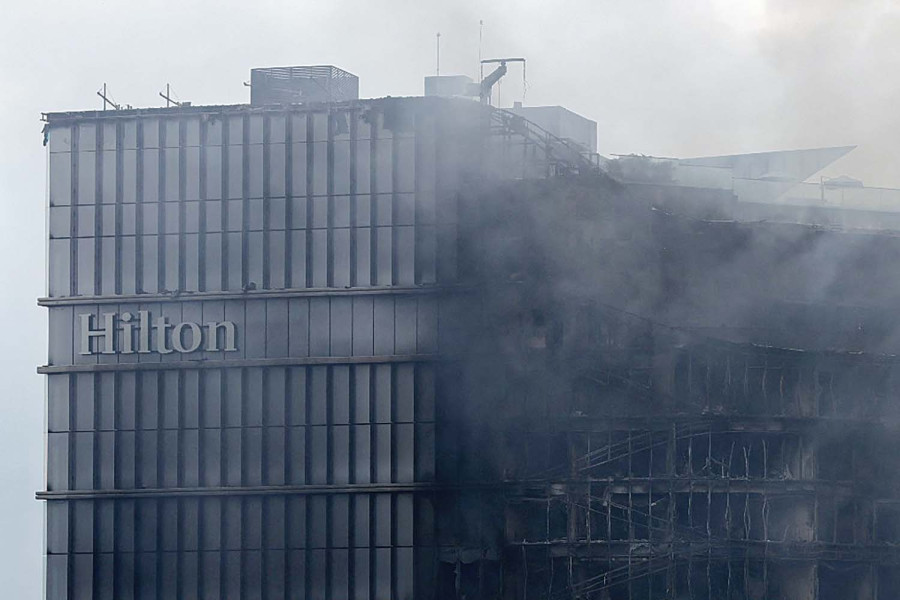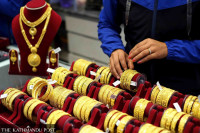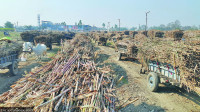Money
Billions lost, thousands jobless as Nepal counts cost of Gen Z uprising
Economists warn Nepal’s growth will stay below 1 percent this fiscal year. But businesses are determined to rise up again.
Sangam Prasain & Krishana Prasain
It is autumn, the time of year when Nepal’s economy is usually vibrant. Hordes of tourists flock to the country, while Nepalis abroad return home to celebrate the long festive holidays. From retailers to hotels, and from airlines to transport operators, businesses typically boom.
But this week, Thamel—along with Durbar Square and other popular tourist spots like Pokhara, Bhairahawa, and Chitwan—remains much quieter than usual. Charred hotels, blackened by smoke, and burned vehicles are common sights across the country.
The recent anti-government protests have scared tourists from around the world, particularly Indians, whose numbers were expected to swell due to heavy bookings for pilgrimage tours to Kailash Manasarovar, the revered site.
Economists estimate the collateral damage at around Rs3 trillion—nearly equal to Nepal’s budget for one and a half years or half of the GDP when damages to both government and private sector infrastructure and government documents are taken into account.
“The economic growth this fiscal year will be under 1 percent, according to our rough estimates,” said economist Chandra Mani Adhikari. Nepal’s biggest taxpayers—Bhat-Bhateni Supermarket, Chaudhary Group, and Ncell—have all suffered heavy collateral damage.
The losses are staggering. This collateral damage comes on top of the prolonged drought that Nepal recently faced. Moreover, the upcoming elections scheduled for March—more than two years ahead of time—are expected to drain another Rs30 billion from state reserves, said Adhikari.
Estimates compiled by hoteliers, automobile dealers, and retail chain Bhat-Bhateni suggest the bloodshed has rendered nearly 10,000 Nepalis jobless overnight.
This week, the Hotel Association Nepal issued a statement noting that the sector had already suffered damages worth Rs25 billion. Auto dealers estimate their losses at around Rs15 billion.
Out of Bhat-Bhateni’s 28 outlets nationwide, 21 sustained damages during Tuesday’s Gen Z protests, with several completely destroyed.
Initial assessments indicate the insurance claim of Bhat Bhateni is more than Rs2.5 billion with IGI Prudential Insurance alone, according to Beemapost, an online news portal.
Hopes, however, are high.
Yogendra Shakya, a noted hotelier, said that in the short term, quick political stability and the appointment of a new prime minister could reassure travelers, limiting the impact on tourism.
In the medium term, however, Shakya warned that if political parties return to disruptive election tactics, confidence could erode, causing deeper damage to tourism over the next six months.
“The real challenge lies in political stability over the coming months—if old habits of agitation and election-centric disruptions continue, that uncertainty could discourage future bookings and long-term confidence in the tourism industry,” he said.
Tourism entrepreneurs have their fingers crossed since Friday’s political developments, as protests have receded and the country has a new prime minister. With the lifting of curfews in most cities, the movement of people and vehicles is gradually increasing.
Retailers, auto dealers, and transport entrepreneurs are again hoping for an economic rebound after this week’s bloodshed.
“The private sector has lost its confidence and morale due to the attacks on corporate houses and private properties, and it also feels insecure,” said Birendra Raj Pandey, president of the Confederation of Nepalese Industries. “But we have to move on, and the good part is that many entrepreneurs have shown the confidence to rise again.”
At the same time, insurance companies are expected to face massive financial pressure.
In the past two decades since the start of the peace process in 2006 Nepal has endured multiple upheavals—from earthquakes to load-shedding, union strikes, and the Covid pandemic—each hurting economic growth. Yet, observers argue, the greatest damage has come from chronic political instability, which has fostered corruption.
This entrenched cycle of rent-seeking, experts say, reflects Nepal’s deep-rooted kleptocracy, where political figures, business elites, and even criminal intermediaries collude to extract benefits for themselves.
“There will be a big challenge for the next government to work transparently,” said Adhikari, the economist.
Despite the pain, business sentiment as expressed on social media is strong, with the private sector actors believing they can soon rise “by dusting off the ashes.”
Chandra Dhakal, president of the Federation of Nepalese Chambers of Commerce and Industry (FNCCI), urged industrialists and businesspeople not to panic or give up. He called on them to rise again, even as he admitted being deeply hurt by the vandalism and damage inflicted on industries during the protests.
“I am a person who started from scratch. There was no capital, but there was a dream, there was a rush. There was determination to do something on my own soil. That determination has turned a narrow commercial path into a wide highway today, after four decades,” Dhakal wrote emotionally on Facebook.
“But recent incidents make me sad. I feel like shedding tears when my own project, into which billions have been invested, suffers unexpected losses. But I am not allowed to do that, because I am responsible for the livelihood of more than 20,000 Nepali brothers and sisters.”
In a statement, FNCCI urged the government to devise short-, mid-, and long-term plans to provide relief to the private sector. The interim government, it said, can help boost confidence through monetary and fiscal policies. The umbrella organization has also begun collecting details of damages to government and private infrastructure.
Karan Chaudhary, president of the Nepal Automobile Dealers Association, told the Post that while the sector has not yet been able to fully assess damages, he remains optimistic that it will recover fast.
Ncell, the private telecommunications giant, also saw its head office vandalized and set on fire. “We will rebuild, rise, and work for the people and country,” the company said.
Business entrepreneurs have taken to social media to express both their pain at the targeted attacks and their determination to rise and rebuild.
On Facebook, Bhat-Bhateni Supermarket wrote, “While the destruction our Bhat-Bhateni family has experienced has been immense, our resolve to rise again is even stronger. Bhat-Bhateni will rebuild. And with you beside us, we’ll come back stronger and build a brighter future together.”
Chaudhary Group was also attacked. Nirvana Chaudhary, managing director of the group, posted on X: “We will rebuild, recover, and rise stronger. History will not remember the flames but how we emerged united, proud, and unbroken.”
Shekhar Golchha, chairman of Golchha Group, shared on X that his property too had been attacked. “We are committed to employment generation and investment, with wishes for a strong democracy,” he wrote.
The Nepal Association of Tour and Travel Agents (NATTA) has assured international tourists, tourism professionals, and stakeholders that Nepal is moving towards stability and has created a safe environment for tourism.
In a statement on Saturday, NATTA welcomed tourists, saying the appointment of Nepal’s first female prime minister has infused new energy into the country following the recent Gen Z-led protests and political changes.
Airports and transport services are operating normally. Domestic airports, including Tribhuvan International Airport, have resumed regular flights.
The Hotel Association Nepal also confirmed that nearly two dozen hotels suffered major damage during the protests earlier this week.
According to preliminary information, most of the directly affected hotels are located in the Kathmandu Valley, Pokhara, Butwal, Bhairahawa, Jhapa, Morang-Biratnagar, Dhangadhi, Mahottari and Dang-Tulsipur.
Vandalism, arson, and looting at domestic and international brands—including the Hilton Hotel in Kathmandu—are estimated to have caused damages of more than Rs8 billion to the hotels.
As the affected hotels cannot resume operations without maintenance and reconstruction, the livelihoods of more than 2,000 employees will suffer during the festive season. These hotels, currently closed, will also struggle to meet their financial obligations to banks and financial institutions.




 10.63°C Kathmandu
10.63°C Kathmandu














